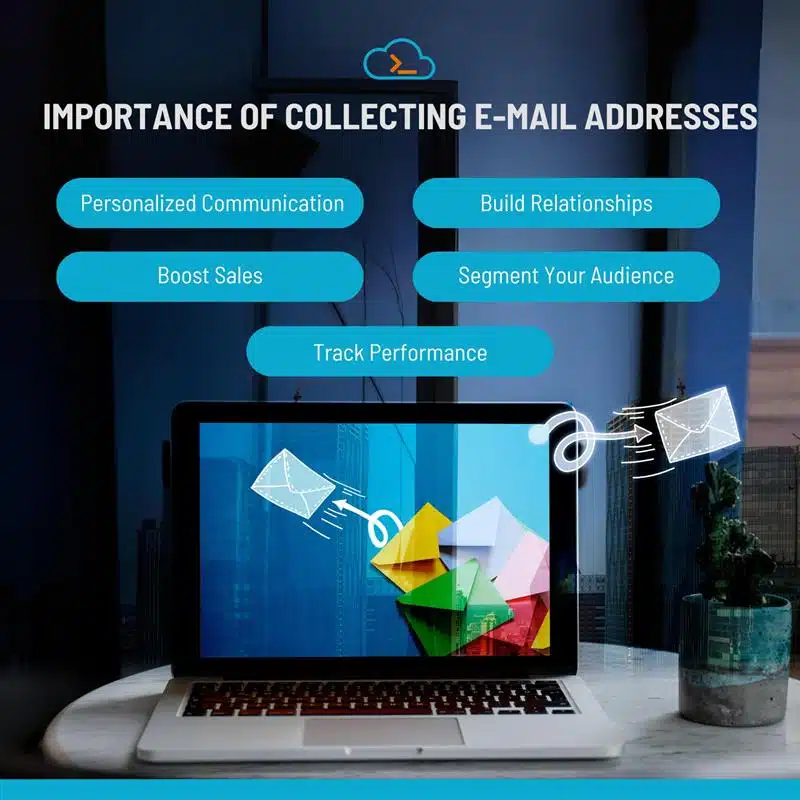What We Cover In This Blog?
Key Takeaways
- Email marketing helps you connect with customers, build trust, and boost sales.
- Use signup forms, offer free stuff (lead magnets), and get permission first.
- Offer clear forms on your website and social media.
- Free e-books, discounts, or webinars in exchange for email addresses.
- Keep it legal- get consent, follow anti-spam laws, and let people unsubscribe easily.
Importance Of Collecting E-mail Addresses
Utilizing e-mail marketing can effectively engage your audience, advertise products, and stimulate conversions. Collecting visitor’s e-mail Id’s allows you to:
- Personalized Communication – E-mail offers a direct channel to send personalized messages to your audience.
- Build Relationships – Regular e-mail marketing updates help foster trust and loyalty.
- Boost Sales – E-mail campaigns can drive traffic to your website and increase sales.
- Segment Your Audience – Collecting e-mails allows audience segmentation, enabling targeted marketing.
- Track Performance – E-mail marketing tools provide analytics on open rates, click-through rates, and conversions.
Discover the Best Digital Marketing Services in Hyderabad, customized to enhance your online visibility and propel business expansion. The expert teams specialize in delivering targeted strategies and impactful campaigns to help you achieve your marketing goals.
Strategies To Collect E-mail Addresses
1. Utilize Opt-In Forms
Opt-in forms are essential for collecting visitor’s e-mail addresses. They represent the most straightforward method to encourage website visitors to join your e-mail list.
Types of Opt-In Forms
- Signup Forms – Put them in prominent locations like the bottom section, top area, or side panel of your web page for easy visibility.
- Pop-Up Forms – Activate these forms according to user actions, such as duration spent on a page or scrolling behavior.
- Landing Pages – Create dedicated pages that focus solely on converting visitors into e-mail subscribers.
- Exit-Intent Pop-Ups – Use technology to detect when a visitor is about to leave your site and present a valuable offer.
2. Offer Valuable Content
Lead magnets are incentives that encourage visitors to exchange their e-mail IDs for valuable information.
Examples of Lead Magnets
- eBooks – Provide in-depth information on a relevant topic.
- Whitepapers – Offer comprehensive analyses or reports.
- Checklists – Share step-by-step guides.
- Webinars – Host live or recorded sessions on topics of interest.
- Discounts and Coupons – Offer special deals for subscribers.
3. Incorporate Interactive components
This tool can engage visitors and prompt them to share their e-mail addresses.
Interactive components
- Quizzes – Offer personalized results in exchange for an e-mail address.
- Surveys – Collect feedback and insights while gathering e-mail addresses.
- Contests and Giveaways> – Encourage participation by offering prizes for e-mail subscriptions.
4. Leverage E-mail Finder Tools
These tools can help you discover and verify the e-mail addresses of potential customers.
Popular E-mail lookup Tools
- Finds e-mail addresses based on domain names.
- Enriches contact info with additional data.
- Locates e-mail addresses with high accuracy.
5. Promote Through Social Media accounts
Social media platforms are excellent channels for website traffic to your e-mail signup forms.
Social Media Strategies
- Regular Posts – Share links to your signup form or landing page.
- Targeted Ads – Run ads promoting your e-mail list.
- Events – Host webinars or live sessions that require e-mail registration.
Cooperating with the Best Digital Marketing Agency in India can transform your online approach and propel your business to unprecedented success.
6. Implement A Referral Program
Referral programs encourage your existing followers to advocate for your e-mail list to others.
Setting Up a Referral Scheme
- Offer Incentives – Provide rewards like discounts or restricted content for referrals.
- Use Referral Tools – Platforms like ReferralCandy can help manage your referral scheme.
7. Optimize Call To Action (CTA)
Your CTA should be compelling and clearly guide visitors to provide their e-mail addresses.
Effective CTAs
- Clear and Direct – Use phrases like “Subscribe Now” or “Get Your Free Guide.”
- Create Urgency – Use terms like “Limited Time Offer” to encourage quick action.
- Highlight Benefits – Clearly state what the visitor will receive in exchange for their e-mail.
8. Utilize Exit-Intent Technology
Exit-intent technology triggers a pop-up form when a visitor is about to leave your site, encouraging them to subscribe.
Tools for Exit-Intent Pop-Ups
- OptinMonster – A popular list-building tool for creating exit pop-ups.
- Sumo – Offers various pop-up options, including exit pop-ups.
9. Create A Visually Appealing Website
A well-designed website can significantly enhance e-mail registrations.
Design Tips
- High-Quality Images – Use visuals to attract attention.
- Simplicity – Avoid clutter to ensure forms are easy to find and use.
- Mobile Optimization – Ensure your site and forms are mobile-friendly.
10. Integrate E-mail Collection With E-commerce Stores
For online stores, there are several touchpoints where you can gather e-mail IDs.
E-commerce Strategies
- Checkout Process – Include an option to subscribe during checkout.
- Order Confirmation Pages – Offer discounts or special offers on the confirmation page.
- Account Creation – Prompt customers to establish an account and subscribe seamlessly throughout the process.

Legal Considerations
Gathering e-mail IDs should adhere to data protection laws to prevent legal complications and preserve trust.
- Obtain Explicit Consent – Always get explicit consent from visitors before adding them to your e-mail list. It’s typically done through opt-in forms.
- Comply with Data Protection Laws – Be aware of and adhere to applicable laws, including GDPR in Europe and the CAN-SPAM Act in the USA.
- Provide Easy Unsubscribe Options – Each e-mail you send must provide an easy method for recipients to opt out.
- Clearly State How E-mails Will Be Used – Ensure clarity regarding the utilization of collected e-mail addresses and incorporate a link to your privacy policy.
- Store Data Securely – Ensure the e-mail addresses you collect are stored securely to prevent unauthorized access.
Digital Marketing Services are essential tools for expanding your brand’s reach online and engaging with customers effectively. Utilizing an array of digital platforms and strategies enables you to build relationships, engage with your target audience, and drive conversions, thereby growing your business in the digital world.
Conclusion
Acquiring e-mail addresses from your website visitors is fundamental to crafting a successful e-mail marketing strategy. By employing a mix of opt-in forms, engaging content, interactive elements, and social media promotion, you can grow your e-mail list effectively. Always ensure you collect e-mails legally by obtaining explicit consent, complying with data protection laws, and providing easy unsubscribe options. Executing these tactics will aid in constructing a roster of committed subscribers, fostering enduring prosperity for your enterprise.
FAQS
1. How do I get the E-mail addresses of registered users of a website?
When users register on your website, you can collect their e-mail addresses as part of the registration process. Ensure you inform users that their e-mail will be utilized for marketing objectives and acquire their explicit consent.
2. How to legally collect E-mail addresses?
To legally collect e-mail addresses, always obtain explicit consent, comply with data protection laws, provide easy unsubscribe options, clearly state how e-mails will be used, use double opt-in, and store data securely.
4. How can I increase E-mail Signups on my website?
Increase e-mail signups by using subscription forms, offering valuable content, incorporating engaging features, leveraging social media, optimizing CTAs, providing exclusive access to exclusive content, and utilizing exit-intent technology.

Rasmita Patro
About The Author…
Meet Rasmita Patro, a content writer, a former teacher, and a former HR with a passion for storytelling, creating compelling content that engages and informs readers. She has a Master’s in Economics and an MBA degree in Human Resources. Her expertise spans a variety of industries, including finance, healthcare, technology, and others. She has a particular inclination toward crafting blog posts, articles, and social media content that resonates with the target audience. She loves reading different genres of books, love to experiment with cooking, and listening to soothing music.

